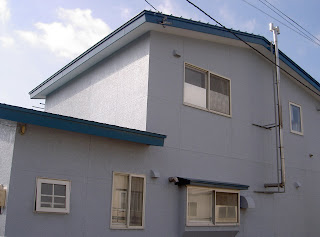Japanese is already becoming easier to slip into at any time, which is a great feeling, but the road to ペラペラ (pera pera, the onomatopoeia for the sound of speaking fluently) is paved with many simple fill-in-the-blank workbook exercises, which are making me miss Yale and intellectually rigorous classes.
The other day, we went to visit okaasan's friends, the Noudas. The Nouda's have a very old, impressive buddhist shrine in their house, which they were happy to explain and show me. The explanations of Buddhist practices were a little hard to follow sometimes, but they showed me small offerings of food and flowers that they put on the shrine everyday. We have a shrine in our house too, but it's much smaller-- I'll try to upload pictures of both ours and the Noudas'.
Okaasan then told them (a favorite topic of hers) about all the different Japanese food I can eat, which led to a discussion of American food. Many Japanese people I've met here seem to think that we eat hamburgers daily and that bread in America is a direct equivalent to rice in Japan-- I even think I heard okaasan say we ate "panshoku," which means "bread-centered diet." Unless we're eating noodles (soba, udon or ramen) my host family eat rice for breakfast, lunch and dinner along with various tsukemono (side dishes) and often fish. They often seem to think that we do the same with "pan" or bread in America, with plain bread being the staple of every meal. This has presented a slight dilemma: Japanese bread is like highly-processed American bread, but each slice is about twice as thick, and nearly as large as my fac,e and many years of being a host mother seem to have inexorably convinced okaasan that I need this gargantuan bread every morning at breakfast.
This weekend, all the HIF students visited Ohnuma National Park and stayed in the Ohnuma Green Pia Hotel for a night. The park was very pretty, with a dramatic volcano rising above connected lakes, but we didn't stay for long, so I didn't get far beyond the touristy stalls. The hotel itself had an onsen which was a lot of fun, and we went in a couple times. At breakfast I ate an entire small packet of nattou (sticky, fermented soy beans,) the only Japanese food that I still simply cannot stomach is uni (sea urchin,) but if I somehow feel that if I can manage to conquer uni, I can't be daunted by anything in this country.
Recently, I've managed to have slightly more complicated conversations with okaasan. She explained her favorite Korean historical drama to me yesterday, and the day before we discussed Japanese citizens with Korean or Chinese heritage. Otousan is not particularly talkative-- he likes to sit with his beer, eating nattou and watching Japanese variety shows. His sentences are very short, casual and slurred together, but I have learned that there is a good chance he is asking me if I want to eat or drink something, probably "cora" (coke, a beverage that, according to otousan, all Americans enjoy.) He is still much more difficult to understand than okaasan, but I've realized that okaasan's speech also has a difficult point: she pronounces the Japanese syllable I learned in school as "ga" as a very nasal "hnyaah" type noise. It took me forever to realize that it was a "ga" and it still throws me off occasionally, but since I talk with her the most, okaasan is still the easiest to understand. Sana, her grandaughter, is only 9 years old, but is adorable, very friendly, and excellent at describing things in a way that make sense to me. She recently lent me one of her books, about middle school friendship, and I am painstakingly making my way through it.
I'm enjoying going for a jog every day here and exploring the area around the house. Yesterday I found a route that goes into the countryside near the house through the rice paddies. I'll try to take a picture of it this weekend- it really does give the feeling of being in rural Japan.

Okaasan, "beveling" the delicious daikon

A poster for the Hokkaido Nippon Ham Fighters
The view of HIF from the bottom of the hill, with Mt. Hakodate in the background.


